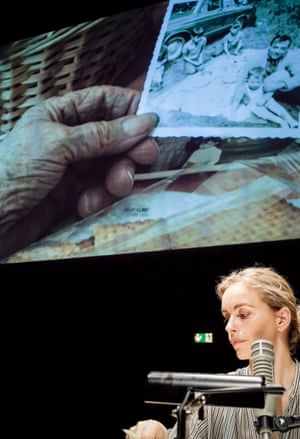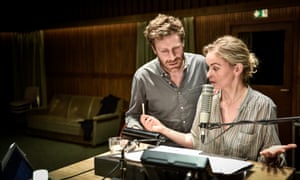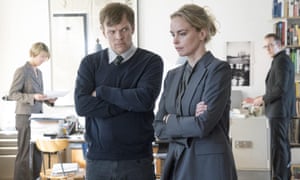Nina Hoss: 'The left is in a state of absolute chaos – we have lost our way' | Stage
When Nina Hoss agreed to perform a Manic Street Preachers song with the Welsh alt-rockers at Glastonbury in 2014, she had no idea that the track â€" Europa Geht Durch Mich (Europe Passes Through Me) â€" would soon come to sound like a requiem. “It felt like such an optimistic song at the time,†she recalls, “and the crowds were going absolutely wild.â€
Three years later, as negotiators head from London to Brussels with the goal of curtailing the movement of people between Britain and the continent, Hoss is heading the other way â€" with a project designed to show what European cross-pollination can achieve before the door slams shut.
For this month’s Manchester international festival, the 41-year-old German actor and her collaborators â€" Berlin Schaubühne director Thomas Ostermeier and Bush Moukarzel, an Irish actor, writer and director â€" have devised an English-language dramatisation of the memoirs of a French sociologist. The show is a sort of group therapy for liberal Europeans discombobulated by the events of the last 12 months.
The project was conceived just after Donald Trump’s election victory last November, which Hoss experienced first hand while filming a new series of Homeland (she plays German intelligence agent Astrid) in New York. Having been due back in Berlin to star in a play based on Jean Cocteau’s The Human Voice, she called Ostermeier and said she couldn’t imagine coming back to do a play about a woman despairing over a lost lover. “I’m not interested in it right now,†she told him, “and I can’t imagine anyone else who would be.â€

Ostermeier told her he was reading Returning to Reims by Didier Eribon, a French sociologist and the celebrated biographer of Michel Foucault. Get hold of a copy as soon as possible, he said. “Reading it opened floodgates inside me,†she recalls, sitting in a shady corner outside the converted 1920s cinema that is now home to the Schaubühne. “It tried to address all the questions we are grappling with. What is going on with this generation of ours? Do we still believe in democracy? If we do, is that belief reawakening or dying? Do we still know how to organise ourselves to have influence on a political scale? And are we really interested and patient enough to get involved â€" or did we unlearn that in the 90s because we believed our parents had paved us a path to prosperity?â€
Originally published in France in 2009, Retour à Reims became a bestseller in Germany last year, partly because it hinted at an explanation for the Brexit vote and Trump earthquakes, as well as the then looming nightmare of a far-right French presidency. It tells the story of the author returning to his hometown for the first time in decades, following the death of his father, only to find that his once staunchly communist family is now more or less openly supportive of the Front National.
Eribon â€" who moved to Paris at 20, becoming an intellectual focused on queer studies â€" had long distanced himself from his working-class upbringing. “My coming out of the closet, my desire to assume and assert my homosexuality, coincided with shutting myself inside what I might call a class closet.â€
His disengagement with the working classes, he argues, mirrors that of the French left. Under Socialist party president François Mitterrand, solidarity had in the second half of the 20th century given way to “social contractâ€, and resistance to reform: “The left started to speak the language of those who govern, no longer those who are governed.â€
Not every critic in France has agreed with Eribon’s analysis, and some studies suggest Marine Le Pen’s party draws more support from the middle class than formerly Communist-voting workers. But Hoss admired the way Eribon didn’t pull any punches when it came to his own political tribe. “I liked it because I can be very unflinching with the left, too. We are in a state of absolute chaos at the moment. We have lost our way.â€

If Hoss talks about the left in the first person plural, it is because leftwing politics were part of her upbringing in ways that echo Eribon’s: her late father, Willi Hoss, joined the Communist party aged 16 and studied Hegel at university, only to work as a welder at the Daimler factory in Stuttgart, where he established an independent union. In 1979, he was a founding member of the German Green party, which he left in protest over the war in Afghanistan.
“I grew up in a different social environment to the one Eribon describes, but I rediscovered a lot in his book of what I remember hearing around the kitchen table. Until I was around 12, I used to sit in on my father’s union meetings and draw pictures.â€
Ostermeier’s production takes the form of a video essay about Eribon’s journey, with Hoss speaking a live voiceover that strays into a discussion with her director, played by Moukarzel â€" a first foray into discourse theatre for a man better known for anarchic stagings of the classics, with the Dublin theatre group Dead Centre.
“The tragedy Eribon describes is not just that the educated bourgeoisie has neglected the working classes,†Hoss says, “but that it has left them feeling ashamed about the class they belong to. That used to be different. Neoliberalism has managed to take away the safety net underneath people’s lives â€" and convinced them that, from now on, it will be entirely their own fault if they fail. If there is ever going to be a revival of the left, it’ll be because they have managed to fill that space and regain trust. We have to work together to make sure people feel valued and connected again.â€
Martin Schulz, the German Social Democrat leader who is struggling to mount a credible challenge to Angela Merkel in the September elections, has made much of restoring human dignity. But when I ask whether Hoss has considered joining a party, like many others have done in the wake of Trump’s victory, she shakes her head in mock disgust.

“I am suspicious of political parties. They are machines. You end up finding a middle way, and lose sight of your original goal.†Freed of such restraints, she says, “you can question the political system as a whole. You can ask yourself, for example, whether traditional parties can still offer us the right answers.â€
Does theatre have better answers? Hoss chuckles. “Of course not. I don’t have any solutions. I only have questions. And yet I am oddly optimistic. Playing allows us to expand reality. By playing we can explore, exaggerate and sharpen ideas with great freedom and thus reach some sort of insight. Thinking and doing are important, but only art allows us to break down borders in our imagination.â€
• Returning to Reims is at Home, Manchester, 5-14 July, part of the international festival. Michael Lucey’s translation of Didier Eribon’s book is published by Semiotext(e).

0 Response to "Nina Hoss: 'The left is in a state of absolute chaos – we have lost our way' | Stage"
Posting Komentar